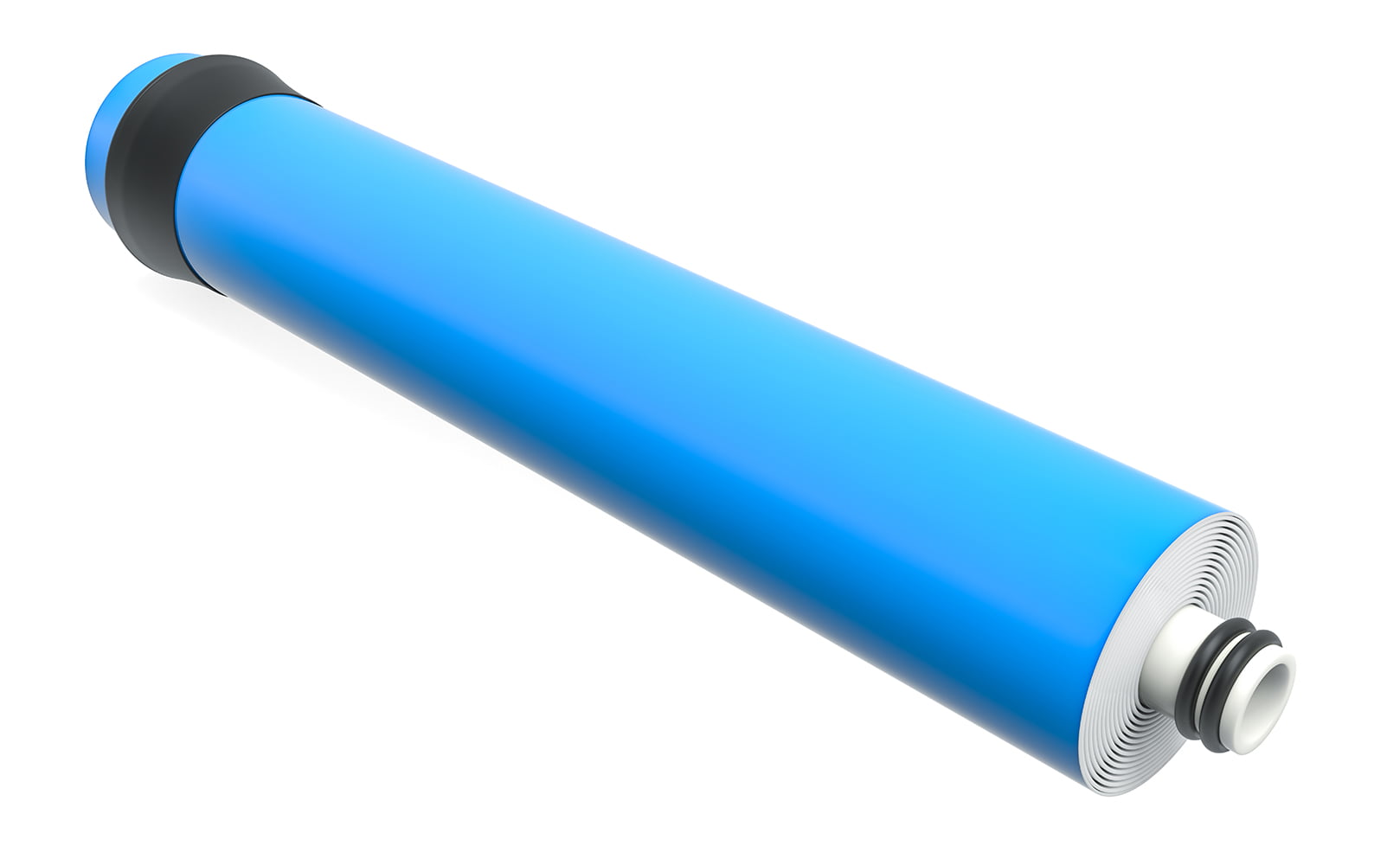Does Reverse Osmosis Remove Calcium from Water?
Written by: Gene Fitzgerald // Last Updated: Sep 8, 2023
This page may contain affiliate links. If you buy a product or service through such a link we earn a commission at no extra cost to you. Learn more.
Along with the many water contaminants that get removed by reverse osmosis, certain minerals also gets stripped away.
Does this also include calcium? Does reverse osmosis really remove calcium from water? And if so, is this something you should worry about?
Let’s find out!
Key Takeaways
- Calcium gets removed from water when it’s filtered with reverse osmosis.
Does Reverse Osmosis Remove Calcium from Water?
So, does reverse osmosis remove calcium from water?
Yes, reverse osmosis does remove calcium from water.
It does so with an efficiency of more than 95%. In some cases it can go as high as 98%. This depends mainly on the overall contamination level of your water and the presence of other elements which might impact the operation of the reverse osmosis membrane.
How Much Calcium Does Reverse Osmosis Remove?
As we mentioned above, the filtration strength of reverse osmosis is between 95% and 98% when it comes to calcium. In other words, if your water naturally contains less calcium, your output water will also have a lower concentration.
In any case, you can expect the overall level of calcium to be reduced by at least 95%. That’s of course assuming that the system is operating correctly and nothing is impairing it.
How Does Reverse Osmosis Remove Calcium?
Reverse osmosis removes calcium the same way it removes other impurities from water. It forces water through a thin semipermeable membrane at a very high pressure. The membranes has tiny pores and as a result, water molecules are able to pass through the membrane, but pretty much nothing else does. Impurities and contaminants are left behind and ejected with the reject water stream.
Membrane Fouling and Other Challenges When Removing Calcium from Water Using RO Filtration
Calcium is a bit more unique than other contaminants when it comes to reverse osmosis. If its concentration in your water is too high, this can have a negative effect on the operation of the reverse osmosis membrane in the long term. Scale will start to build up on your membrane, which will decrease its efficiency as it continues to grow. This makes it important to pay attention to the state of your reverse osmosis membrane.
In essence, you might have to replace your reverse osmosis membrane more often when you’re filtering water with high calcium content. You may also notice that the reverse osmosis system works less efficiently.
One solution to this would be to install a water softener in your home for pre-treatment. A water softener is specifically designed to remove calcium and other hard water minerals.
Other Minerals Removed By Reverse Osmosis Systems
Calcium isn’t the only mineral removed by reverse osmosis. Pretty much all minerals in your water get filtered out as well. This includes, but is not limited to:
Magnesium
Magnesium is useful for regulating your muscles and nervous system. Magnesium deficiency is associated with issues like increased blood pressure and can even lead to a deficiency in other minerals.
Sodium
Sodium helps maintain the right balance of water and other elements in your system. You can easily obtain sodium from many dietary sources, and it’s an important mineral to consume on a daily basis.
Potassium
With the help of potassium, your body maintains healthy levels of fluid in its cells – as opposed to sodium which helps maintain those levels outside of the cells. Your muscles and cardiovascular system depend on potassium in their operation.
Iron
Iron is critical in the production of hemoglobin and myoglobin, as well as for regulating various other functions of your bodily system. You need to consume adequate amounts of iron to stay healthy and to develop well.
Zinc
Zinc is important for your immune system, and it also helps regulate some healing functions of your body. Without enough zinc, your wounds will take longer to heal and your blood won’t clot properly.
Bicarbonate
Bicarbonate can help boost some of your body’s functions, specifically helping you during exercising as well as helping relieve heartburn.
Fluoride
With the help of fluoride, your teeth can grow strong and you can avoid tooth decay. Fluoride can also have some other minor health benefits, although it must be consumed in moderation.
Copper
Copper helps your immune system operate properly and makes you less susceptible to various health complications. It’s also a great antioxidant.
Phosphorus
Phosphorus helps your bones and teeth grow and remain strong, much like calcium does. It’s also useful for other things like helping your body produce certain proteins.
Iodine
Your thyroid gland uses iodine to produce thyroxine, which is used in various bodily functions and is an important component of a balanced diet.
Does That Mean RO Water Is Bad for Your Health?
Does this mean that reverse osmosis water with its lack in minerals is less healthy? This depends on your overall diet. It’s true that many of these minerals have a positive impact on your health. Consuming enough of them on a daily basis is important for staying healthy.
However, our drinking water usually contributes less than 5 percent to your daily requirement minerals intake. The rest comes from the food we eat – at least it should come.
Besides, a lack in minerals from drinking water can easily compensated for. You can take mineral supplements, or you can add a remineralization stage to your filtration setup. This will allow you to balance your diet in a way that doesn’t deprive you of any important nutrients. At the same time, you won’t have to worry about water contaminants.
What Is Calcium?
Calcium is an important mineral in everybody’s diet. It promotes bone and teeth health. At the same time, it regulates blood clotting and other important biological processes. This makes it important to receive a sufficient daily intake of calcium. You often get a lot of it from the various foods you consume on a regular basis.
Why Remove Calcium in the First Place?
It’s pretty hard to push your diet to a level where you’re taking too much calcium. The mineral is overall healthy and beneficial to you in various quantities. You should remember that reverse osmosis isn’t designed to specifically remove calcium. It’s just a side effect of the way it operates.
There is no feasible way to make a reverse osmosis system that only removes bad contaminants and leaves good ones in the water. However, as we mentioned above, there are ways to increase the mineral content of your water after it’s been filtered with reverse osmosis. This can allow you to compensate for the minor downsides to the filtration process and ensure that your diet stays healthy and balanced.
Water Softening as an Alternative Method to Eliminate Calcium in Water
If you face overly hard water chock full of calcium carbonates, you can use water softening to address the issue. Remember: RO membranes are prone to fouling when exposed to too much calcium. Water softeners on the other hand were specifically designed for removing calcium from water.
However, water softening comes with its own downsides. For example, it may introduce a lot of sodium into your water supply. This might not be very healthy for certain people. You should always consult your physician if you’re unsure about your exact dietary requirements.
If you have any thoughts about the question, does RO remove calcium, please don’t hesitate to leave a comment below!
Information provided on BOS is for educational purposes only. The products and services we review may not be right for your individual circumstances.
We adhere to strict editorial guidelines. Rest assured, the opinions expressed have not been provided, reviewed, or otherwise endorsed by our partners – they are unbiased, independent, and the author’s alone. Our licensed experts fact-check all content for accuracy. It is accurate as of the date posted and to the best of our knowledge.



